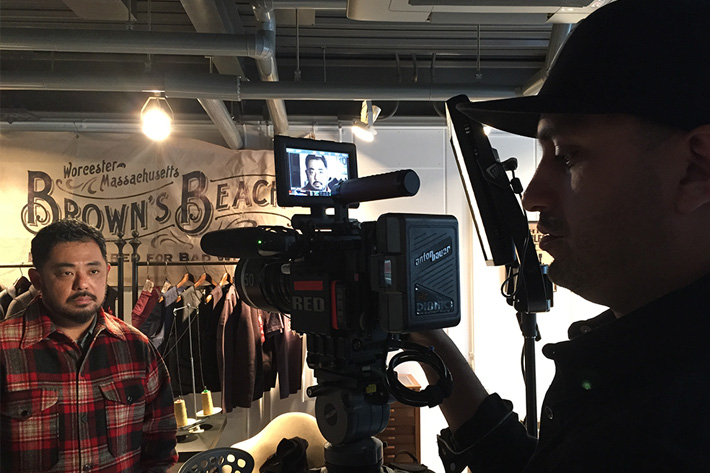
The official trailer went viral and was seen by millions of people. The film, a voyage of discovery of the mysteries of Japanese denim, shot in 12 days, is a project the filmmaker prepared for five years.
Passion is what we live for. It’s what drives us every day and gives us a clear purpose in life. And when it comes to passion, few paths are more dedicated, respected, meticulous, and artistic than the creation of Japanese denim. A true love song to Japanese art and culture, the film Weaving Shibusa gives audiences an insider’s look into the craftsmanship and passion that goes behind making one of the most commonly used goods in the world.
“It’s such a small market that’s filled with all sorts of misinformation and I just wanted to hear the real story,” explained Devin Leisher, director and producer of Weaving Shibusa. “When people are fully dedicating their entire lives to one specific thing that they’re really passionate about, I think that’s a story worth being told. I know the idea sounds crazy, but people are going to care.”
Weaving Shibusa is the story of Japanese craftsmanship and dedication, shown through their love and fascination of denim. The film gives unprecedented access to the mysterious and storied industry of Japanese denim, told by the only people who can; world-renowned vintage denim experts, the highly regarded “Osaka 5”, responsible for Japan’s denim revival, as well as passionate innovators who’s unparalleled work has made “Japanese Denim” synonymous with the highest quality possible.
What makes Japanese denim special is not only the materials, machinery, and techniques, but also the people and ideas behind the process. That’s what the film, created by Devin Leisher, Erik Motta, and Mehdi Ahmadi, reveals: the intense passion and insight behind Japanese denim. Beautiful as it may be, it also also poses the question; what is the future of these garments that are so deeply rooted in the past?
Filmed this past February, Weaving Shibusa takes viewers all over Japan and inside the domain of some of the best denim makers in the world. Told entirely in Japanese with English subtitles, the film’s intimate narrative and rich visuals around the denim artisans has been an instant sensation. The film’s trailer has already been shared with an audience of over 74 million people globally on major news publications including CNN, Esquire, the Huffington Post, and more.
With magnificent storytelling, the film takes you from the Japanese mountaintops and scenic city views to the Shinya Mill to watch the handmade work of the craftsmen. Producing a film that crossed language barriers to reveal the passion of denim craftsmen had its challenges.
“It’s something that I’ve been wanting to film for the last five years, but the whole thing was insane for us to do. Logistically, it was really tough especially since it was in Japan and we didn’t speak the language or were familiar with the country. And there’s not a strong support for certain gear over there so all the equipment that we went with had to be rock solid and we had to bring back up options. If something were to happen, we were pretty much on our own.”
With a story to tell, Leisher, DP Erik Motta, and Mehdi Ahmadi from his Tier 10 production crew flew from the United States to Japan and shot the documentary within 12 days while hauling all the gear themselves. Considering their nomadic trip and the timeline of the project, Leisher and his crew brought two RED Dragons, Anton/Bauer batteries, a set of six heavyweight Schneider CINE-Xenar III lenses, and the original Astra Bi-Color LED panels from Litepanels.
“Before this project, we hadn’t actually used the Litepanels Astras so, at the last minute, we decided to take some 650 Fresnels because we didn’t know what to expect. Turns out, we didn’t have to take out those 650 lights once. We were totally surprised and blown away by how much output we got with the Astras.”
Since Leisher dealt with several competing sources of light inside the mills, outside on the street, and inside the denim shops, the Litepanels Astra Bi-Color LED panel matched his needs perfectly. Four times brighter than the original 1×1 LED panels, the Astra Bi-Color’s higher intensity resulted in a longer throw that could illuminate a wider area with the flexibility to dim the intensity from 100% to 0. This gave Leisher the best versatility since he could get enough punch outdoors at full intensity yet could still dim the light for use indoors.
“Going into this, we had no idea the types of locations we would be in and we really couldn’t have pulled this off without the Astras. When we filmed all the footage inside the mill where they were weaving the denim, we just slapped a battery on the back of the Astra and went through the place handheld to get the right shot. They were super light and no fuss.”
The Astra Bi-Color easily adapted to any lighting situation that Leisher and his team were in thanks to its accurate adjustability between daylight and tungsten. Designed with premium, high CRI, surface mount LEDs and custom TIR optics, the Litepanels Astra Bi-Color offered them consistent, superior color reproduction, saving them time in post-production on color correcting.
“We’ve used other LED lights before and usually the LED would be too hard or the color would be off, but that’s not the case with the Astras. I mean, just look at the trailer. The light is really pleasing and you could get really great shaping with the doors. Now, whenever we travel we bring at least one Litepanels Astra with us no matter what. It’s an ace in the hole that we always end up using. And for a project where we didn’t have a lot of control or time, they really saved us.”

